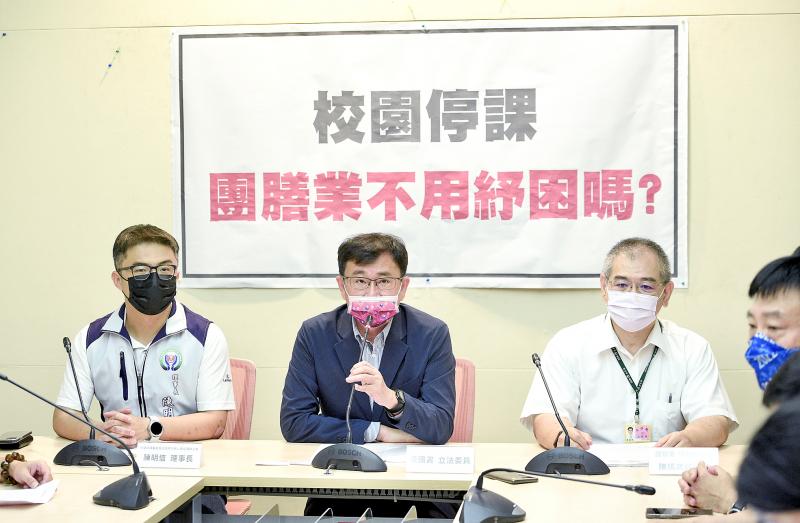The government should offer relief funds to school lunch caterers, whose businesses were disrupted by the Ministry of Education’s policy authorizing schools to switch to virtual classrooms amid the COVID-19 pandemic, Democratic Progressive Party Legislator Huang Kuo-shu (黃國書) said yesterday.
Last year, in-person classes were canceled nationwide after the government raised the COVID-19 alert to level 3, and the government subsidized school lunch caterers for financial losses sustained from food they had bought before the schools were closed, Huang said, adding that they were compensated for lost revenue and salaries as well.
The financial losses that caterers have sustained this year, which they suffered through no fault of their own, was no less than that of last year, he told a news conference in Taipei, adding that the government should keep them in mind when it distributes relief funds.

Photo: Lo Pei-der, Taipei Times
While schools are supposed to compensate caterers for their losses based on the procurement contracts, they generally do not have such funding, he said.
Chen Ming -hsin (陳明信), chairman of a business association for boxed meal operators, said they should be compensated based on their contracts with schools, and a mechanism should be established to settle future disputes.
“As school lunch caterers, we must obtain special permission from schools to offer services and maintain high hygiene standards,” he said. “Last year, we experienced the longest summer vacation of three-and-a-half months. This year, our collective business losses in April and May are expected to exceed NT$400 million [US$13.6 million].”
School lunch caterers serve meals to 1.71 million pupils across the country daily, Chen said, adding that 10 large school lunch caterers have had to close down over the past two years because of inflation and the pandemic.
The government should offer them financial assistance, he said.
“This year, the situation was even more chaotic, because local governments were authorized to decide on their own if school should be closed,” Chen said. “We were often notified on Friday or even on Sunday that schools would switch to virtual classrooms on Monday, but we need to purchase ingredients at least three days in advance and begin marinating meat ahead of time. If schools were closed, we would have to donate the purchased food ingredients to charity groups or throw them away when they rot.”
School lunch caterers should not be asked to bear the losses alone, Chen said, adding that net margins are already low at 3 to 5 percent.
Many of their employees are women returning from a career gap, and they might find other jobs if school lunches were canceled for more than two months, he said.
Chen Hsi-hung (陳錫鴻), deputy director of student affairs and school security division at the ministry’s K-12 Administration, said that schools and school lunch caterers have contracts which stipulate that schools should compensate caterers for all additional costs incurred if they are not liable for the increase in costs.
Schools can also extend their contracts with caterers, he said, adding that the ministry will help schools fulfill the terms of the contracts.

Chinese Nationalist Party (KMT) Chairman Eric Chu (朱立倫), spokeswoman Yang Chih-yu (楊智伃) and Legislator Hsieh Lung-chieh (謝龍介) would be summoned by police for questioning for leading an illegal assembly on Thursday evening last week, Minister of the Interior Liu Shyh-fang (劉世芳) said today. The three KMT officials led an assembly outside the Taipei City Prosecutors’ Office, a restricted area where public assembly is not allowed, protesting the questioning of several KMT staff and searches of KMT headquarters and offices in a recall petition forgery case. Chu, Yang and Hsieh are all suspected of contravening the Assembly and Parade Act (集會遊行法) by holding

PRAISE: Japanese visitor Takashi Kubota said the Taiwanese temple architecture images showcased in the AI Art Gallery were the most impressive displays he saw Taiwan does not have an official pavilion at the World Expo in Osaka, Japan, because of its diplomatic predicament, but the government-backed Tech World pavilion is drawing interest with its unique recreations of works by Taiwanese artists. The pavilion features an artificial intelligence (AI)-based art gallery showcasing works of famous Taiwanese artists from the Japanese colonial period using innovative technologies. Among its main simulated displays are Eastern gouache paintings by Chen Chin (陳進), Lin Yu-shan (林玉山) and Kuo Hsueh-hu (郭雪湖), who were the three young Taiwanese painters selected for the East Asian Painting exhibition in 1927. Gouache is a water-based

Taiwan would welcome the return of Honduras as a diplomatic ally if its next president decides to make such a move, Minister of Foreign Affairs Lin Chia-lung (林佳龍) said yesterday. “Of course, we would welcome Honduras if they want to restore diplomatic ties with Taiwan after their elections,” Lin said at a meeting of the legislature’s Foreign Affairs and National Defense Committee, when asked to comment on statements made by two of the three Honduran presidential candidates during the presidential campaign in the Central American country. Taiwan is paying close attention to the region as a whole in the wake of a

OFF-TARGET: More than 30,000 participants were expected to take part in the Games next month, but only 6,550 foreign and 19,400 Taiwanese athletes have registered Taipei city councilors yesterday blasted the organizers of next month’s World Masters Games over sudden timetable and venue changes, which they said have caused thousands of participants to back out of the international sporting event, among other organizational issues. They also cited visa delays and political interference by China as reasons many foreign athletes are requesting refunds for the event, to be held from May 17 to 30. Jointly organized by the Taipei and New Taipei City governments, the games have been rocked by numerous controversies since preparations began in 2020. Taipei City Councilor Lin Yen-feng (林延鳳) said yesterday that new measures by